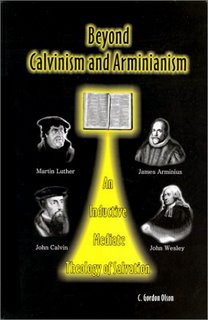Anyone who has taken the time to read much of Charles Spurgeon knows he believed in, and preached, the dreaded doctrine of “limited atonement,” or as many of us prefer to put it, “particular redemption.” I took the time last year when Dave Hunt’s new book came out to read a sermon from Spurgeon that made the point rather clear. Many have pointed out his glaring error in asserting that Spurgeon denied limited atonement in “unequivocal” language. Hunt has waffled on the subject (the term “unequivocal” doesn’t really leave you much meaningful wiggle room), and about as close as he’s gotten to an admission he was wrong is to say that perhaps he was somewhat “strong” in his language. It would be very nice if Dave would just say, “OK, sorry, I blew it,” but that does not seem a possibility.
Well, a few weeks ago Phil Johnson of spurgeon.org pointed out the probable source of Dave’s error. He points to Samuel Fisk’s book, Election & Predestination. Hunt lists Fisk as one of his sources (Hunt relied heavily upon such secondary sources, and I have always surmised, given the character of the quotation, and how the sermon goes on to identify limited atonement as Christian doctrine, that Hunt had simply grabbed this from somewhere else). Compare these two citations for yourself:
| Fisk, p, 149-150 | Hunt, p. 19 |
| But it is best to let Spurgeon speak for himself here. And that he did in strong words: “I know there are some who think it necessary to their system of theology to limit the merit of the blood of Jesus: if my theological system needed such a limitation, I would cast it to the winds. I cannot, I dare not allow the thought to find a lodging in my mind, it seems so near akin to blasphemy. In Christ’s finished work I see an ocean of merit; my plummet finds no bottom, my eye discovers no shore. There must be sufficient efficacy in the blood of Christ, if God had so willed it, to have saved not only all in this world, but all in ten thousand worlds, had they transgressed their Maker’s law. Once admit infinity into the matter, and limit is out of the question. Having a Divine Person for an offering, it is not consistent to conceive of limited value; bound and measure are terms inapplicable to the Divine sacrifice. The intent of the Divine purpose fixes the application of the infinite offering, but does not change it into a finite work.” |
Spurgeon himself, so often quoted by Calvinists to support their view, rejected Limited Atonement, though it lies at the very heart of Calvinism and follows inevitably from its other points — and he did so in unequivocal language: “I know there are some who think it necessary to their system of theology to limit the merit of the blood of Jesus: if my theological system needed such a limitation, I would cast it to the winds. I cannot, I dare not allow the thought to find a lodging in my mind, it seems so near akin to blasphemy. In Christ’s finished work I see an ocean of merit; my plummet finds no bottom, my eye discovers no shore. … Having a Divine Person for an offering, it is not consistent to conceive of limited value; bound and measure are terms inapplicable to the Divine sacrifice.” |
And then read what both authors somehow missed on the very next
page:
Blessed be God, His elect on earth are to be counted by millions, I believe, and the days are coming, brighter days than these, when there shall be multitudes upon multitudes brought to know the Saviour, and to rejoice in Him. Some persons love the doctrine of universal atonement because they say, “It is so beautiful. It is a lovely idea that Christ should have died for all men; it commends itself,” they say, “to the instincts of humanity; there is something in it full of joy and beauty.” I admit there is, but beauty may be often associated with falsehood. There is much which I might admire in the theory of universal redemption, but I will just show what the supposition necessarily involves. If Christ on His cross intended to save every man, then He intended to save those who were lost before He died. If the doctrine be true, that He died for all men, then He died for some who were in hell before He came into this world, for doubtless there were even then myriads there who had been cast away because of their sins. Once again, if it was Christ’s intention to save all men, how deplorably has He been disappointed, for we have His own testimony that there is a lake which burneth with fire and brimstone, and into that pit of woe have been cast some of the very persons who, according to the theory of universal redemption, were bought with His blood. That seems to me a conception a thousand times more repulsive than any of those consequences which are said to be associated with the Calvinistic and Christian doctrine of special and particular redemption.
Could someone help me with the meaning “unequivocal”? 🙂



